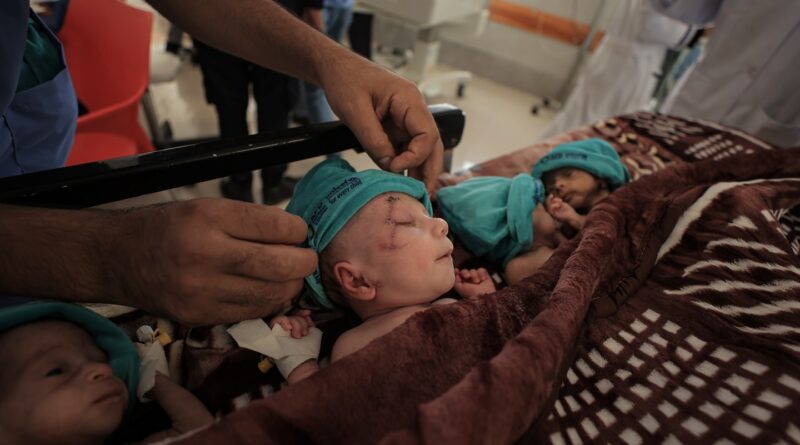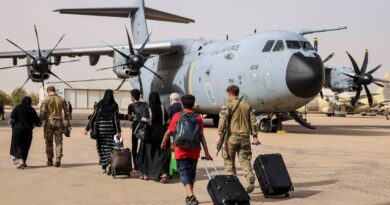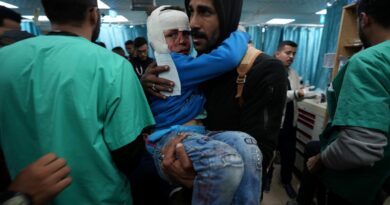A Gazan family, a premature newborn, a painful choice to stay
The news that a United Nations team had evacuated more than two dozen babies from al-Shifa Hospital reached them through a friend. He told Ali Esbeita, the child’s 35-year-old father, to head straight to the Emirati Maternity Hospital in Rafah. Ali scanned the list and saw Anas’s name.
His joy, he said, was “incredible.”
The child now sleeps peacefully, photographs shared by the family show. But the dilemma before his parents encapsulates the impossible choices confronting Gazans every day through this month-and-a-half-long war.
When the World Health Organization carried at least 26 of the newly evacuated babies into Palestine Red Crescent ambulances Monday for passage onward to Egypt and medical care outside a war zone, Anas and his family stayed behind.
“If his mother accompanies him, who will take care of his seven brothers?” Ali asked in a telephone interview. “If I travel with him, who will take care of my wife and children?”
“No one would refuse to let his son be healthy. But if he travels, what if he survives only to find that his family have been killed?”
Hamas fighters entered Israel early on Oct. 7, killed about 1,200 Israelis and foreign nationals, and took more than 240 back to Gaza as hostages. Israel has responded with a military campaign to end Hamas rule in Gaza.
That campaign has devastated the enclave’s health-care system. The World Health Organization has recorded 164 attacks on health-care-related facilities there since the conflict began. By the time Israeli troops laid siege last week to the al-Shifa complex, which military officials allege held multiple Hamas command-and-control centers, the hospital had been reduced to the most basic of functions.
Medical staff at al-Shifa have denied that the militant group used their hospital as a command-and-control center. Israeli investigators have been examining the facility but have presented little evidence to support their claims.
Without fuel to generate the electricity to power the incubators, medical staff wrapped the babies in blankets and medical scrubs and watched as they grew sicker by the day. When WHO officials arrived Saturday, at least 32 of the babies were in critical condition inside the facility. They described it as a “death zone.”
With fighting still raging outside the hospital, the U.N. health agency could stay only one hour, the organization said, as its officials scoped out the facility ahead of the first evacuations the following day. Two of the infants didn’t survive the night.
Ali had seen al-Shifa, but only in better times. Before Oct. 7, it was Gaza’s most advanced and best-equipped referral facility. Anas was born prematurely there on Aug. 16; the doctors said his organs were undeveloped. He had been lying in the incubator ever since, his mother, Warda, pumping milk for him at home and his father delivering it to the hospital almost every day. Their last visit was Oct. 4.
Three days later, Hamas militants overran Israeli border communities, sending raw shock through Israel and leaving Palestinians across Gaza bracing for the war they knew would follow.
Warplanes pummeled northern Gaza; the Esbeita family fled almost immediately. As the airstrikes increased, Ali and Warda shepherded Anas’s seven siblings through two different temporary shelters and eventually to the southern city of Khan Younis.
But they were wracked with guilt. All they had of Anas was the photographs they had kept on their cellphones. “We were blaming each other for leaving him, for abandoning him,” Anas said. “The feeling of helplessness was killing me.”
Cellphone communications in Gaza often go down for hours. When the news reached the family that Israeli troops last week had stormed al-Shifa, they despaired. They believed Anas was dead.
Thousands of civilians were still sheltering inside the hospital. Most of them left Saturday, many walking the 15 miles to Khan Younis, bringing with them horror stories of the dire conditions they had fled.
When the WHO team arrived, they found that none of the babies had mothers there. Palestinian officials had only limited information about their whereabouts. Some were believed to be dead.
In a photograph shared by Tedros Adhanom Ghebreyesus, WHO’s director general, a member of the U.N. team in blue helmet and flak jacket scoops a small baby gently from a hospital bed. The protective gear, necessary for the team’s “high risk” mission through a war zone, reinforced just how miraculous the babies’ survival had been.
The doctors who looked after them, Ghebreyesus said, had shown “extraordinary bravery.”
The Gaza Ministry of Health urged parents who believed that their children might be among the surviving babies to gather at another hospital in the southern city of Rafah. The ministry said they could register to travel in an ambulance convoy out of Gaza and toward a hospital far from the bombs and the fear.
At the Emirati hospital, newly arrived babies fought serious infections from the lack of medical supplies and other difficulties during the final days at al-Shifa. Most were suffering from severe hypoglycemia — insufficient blood sugar, a potentially fatal condition — because they hadn’t been able to drink enough milk, said Ahmed al-Shaer, the deputy head of the nursing department.
Only six mothers had been reachable, al-Shaer said. He did not know what became of the others.
“We expect that they were killed during the war, or displaced and do not know that their children were taken to the Emirati hospital,” he said.
As at least 26 of al-Shifa’s surviving infants were taken to Egypt, Anas stayed behind. In photographs taken by his parents, he finally looked at peace. He and others lay close together in their incubators, with fresh diapers and blankets. In one image, Ali and Warda watch over them, their expressions tender but anxious. They said a doctor had suggested that Anas may be ready for discharge soon.
“I know it won’t be in ideal circumstances if we are all living in a shelter, but at least he will be in my hands,” Ali said.
The infants who were evacuated to Egypt on Monday were received by a fleet of medics. Ali and Warda said they stood by their refusal, but they feared for the future. The Israeli army said during the weekend that it was now pivoting its ground offensive toward Hamas operations in the south.
“With every passing day there are fewer places in which Hamas terrorists can roam about,” Israeli Defense Minister Yoav Gallant said Friday. The people of southern Gaza would soon witness the same “lethal strength,” he said, as Israeli forces had demonstrated in the north.
The south is where the Esbeita family is taking shelter. They’ll stay together now, Ali said, no matter what.
“Do you know what it means to leave your child alone and weak for 45 days, so he falls prey to war, hunger, cold and occupation?” he asked. “That’s why I refuse to let him leave. My family and I believe we must live together or die together. The only solution is for this senseless war to stop.”
Harb reported from London.




